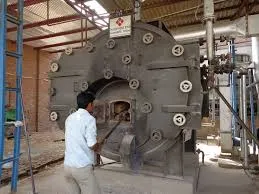
Nov . 06, 2024 12:38 Back to list
Optimal Operating Temperatures for Hot Water Boiler Efficiency and Performance
Understanding Hot Water Boiler Operating Temperature A Comprehensive Overview
Hot water boilers are fundamental components in numerous residential and commercial heating systems. They operate by converting fuel or electricity into hot water, which is then circulated through heating systems to provide warmth and comfort. One critical aspect of hot water boilers that significantly impacts their efficiency and longevity is the operating temperature. Understanding the nuances of this operating temperature is crucial for both users and technicians.
The Importance of Operating Temperature
Operating temperature refers to the heat level at which a boiler functions during normal operations. This temperature can directly affect the efficiency, performance, and safety of the boiler system. Typically, hot water boilers operate between 140°F (60°C) and 180°F (82°C). However, the specific operating temperature may vary based on the boiler design, intended application, and the specific heating requirements of the space being served.
Efficiency Operating a boiler at an optimal temperature can significantly improve efficiency. If the temperature is too low, it may not adequately meet the heating demands, leading to increased run times and higher energy consumption. Conversely, operating at excessively high temperatures can lead to rapid wear and tear on components, potentially leading to costly repairs or replacements.
Comfort For residential settings, the comfort level of living spaces often hinges on maintaining a consistent hot water temperature. Systems designed for radiant heating, such as in-floor heating, necessitate careful temperature management to ensure occupant comfort without wasting energy.
Factors Influencing Hot Water Boiler Operating Temperature
Several factors can influence the optimal operating temperature for a hot water boiler
1. System Type Different types of hot water heating systems have varying temperature requirements. For instance, traditional radiators may require higher water temperatures compared to modern, low-temperature heating systems.
2. Insulation The quality of insulation in a building significantly affects the required operating temperature of a hot water boiler. Well-insulated buildings retain heat more efficiently, potentially allowing for a lower operating temperature without sacrificing comfort.
hot water boiler operating temperature

3. User Needs The specific heating requirements of occupants also play a critical role. For example, commercial spaces may require higher temperatures to accommodate various tasks, while residential homes may prioritize comfort and energy savings.
Safety Considerations
Operating a hot water boiler within the recommended temperature range is vital for safety. Water at high temperatures can pose serious risks, including burns and scalding hazards. Additionally, excessively high pressures can lead to catastrophic failures. Therefore, it is crucial to ensure that boilers are equipped with proper safety mechanisms, such as pressure relief valves and temperature gauges, to prevent unsafe operating conditions.
Maintenance for Optimal Performance
To achieve optimal operating temperatures and ensure a hot water boiler functions efficiently, regular maintenance is essential. This can include
- Flushing the Boiler Sediment buildup can impede performance and efficiency. Regular flushing can help maintain optimal heat transfer. - Checking Safety Devices Regularly inspecting safety devices such as pressure relief valves and temperature controls help avoid hazardous situations.
- Inspecting Controls and Sensors Malfunctioning controls can lead to incorrect temperature settings, impacting both efficiency and safety.
Conclusion
In summary, understanding the operating temperature of hot water boilers is essential for efficiency, comfort, and safety. Knowing how to adjust and maintain this temperature based on the specific needs of the heating system can result in considerable energy savings, improved performance, and extended equipment life. By prioritizing regular maintenance and adhering to safety standards, users can ensure that their hot water boiler operates optimally, providing reliable and comfortable heating solutions. Whether in residential or commercial settings, a well-managed hot water boiler is not only a comfort but also an efficient contributor to energy conservation and safety.
-
High-Efficiency Commercial Oil Fired Steam Boiler for Industry
NewsJul.30,2025
-
High-Efficiency Biomass Fired Thermal Oil Boiler Solutions
NewsJul.30,2025
-
High Efficiency Gas Fired Thermal Oil Boiler for Industrial Heating
NewsJul.29,2025
-
High-Efficiency Gas Fired Hot Water Boiler for Sale – Reliable & Affordable
NewsJul.29,2025
-
High Efficiency Biomass Fired Hot Water Boiler for Industrial and Commercial Use
NewsJul.29,2025
-
High-Efficiency Biomass Fired Hot Water Boiler for Industrial Use
NewsJul.28,2025
Related PRODUCTS






















